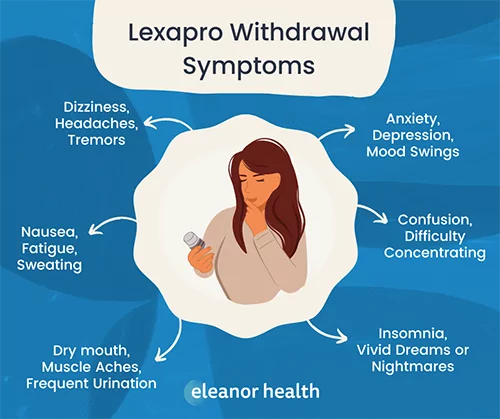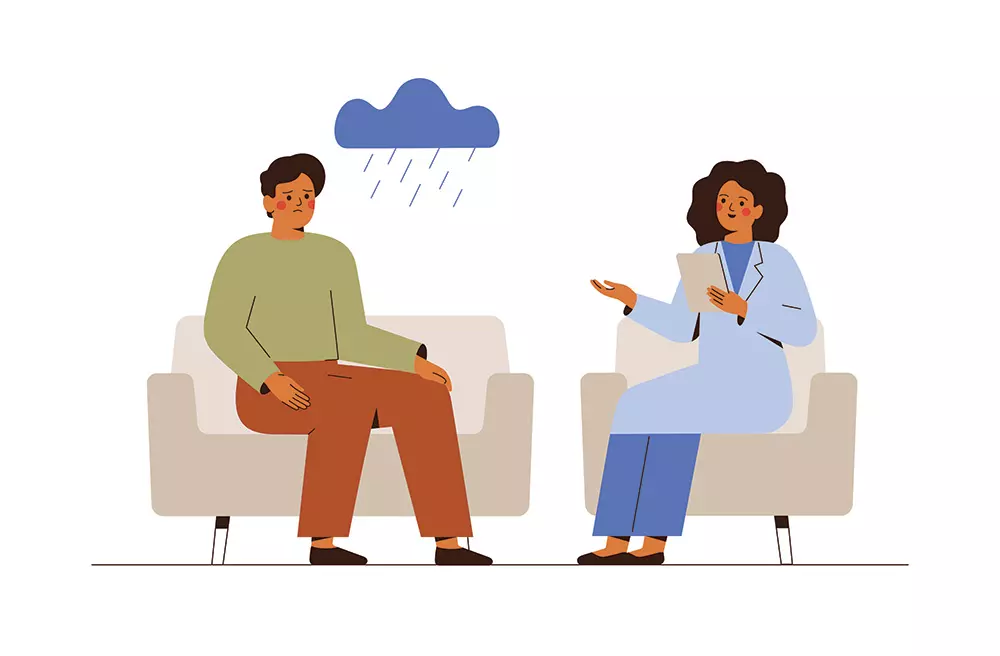Lexapro (Escitalopram) is a commonly prescribed medication for anxiety and depression. And like most medications, Lexapro can cause withdrawal symptoms when it’s discontinued. These withdrawal symptoms vary from mild to severe and can significantly impact a person’s quality of life. If you’re considering tapering off Lexapro or have already started the process, this post will provide valuable insights and strategies to help you manage the withdrawal symptoms effectively.
Lexapro is also known as escitalopram. It’s an antidepressant medication used to treat anxiety and depression. It’s classified under a class of drugs called selective serotonin reuptake inhibitors (SSRIs), which work by increasing the levels of serotonin in the brain. Serotonin is a chemical messenger (neurotransmitter) that regulates mood, sleep, and appetite.
Lexapro works by blocking the reabsorption of serotonin. This then allows serotonin to accumulate in the brain, increasing serotonin available to bind to serotonin receptors. When this happens, you’re likely to experience improved mood and less anxiety and depression.
Lexapro treats major depressive disorder, anxiety associated with depression, generalized anxiety disorder, social anxiety disorder, obsessive-compulsive disorder, panic disorder, and bipolar depression.
Anxiety is a feeling of excessive worry, fear, or nervousness that interferes with daily activities.
Symptoms of anxiety include sweating, increased heart rate, restlessness, irritability, difficulty sleeping, muscle tension, and panic attacks.
Depression is a mood disorder that causes persistent feelings of sadness, hopelessness, and loss of interest in activities that were once enjoyable.
Symptoms of depression include changes in appetite and sleep patterns, fatigue, frustration, and thoughts of self-harm or suicide.
Tapering off medication allows your body to adjust to the decrease in medication gradually. It also allows you to minimize the risk of withdrawal symptoms, which can be uncomfortable and potentially dangerous to your body.
Withdrawal is a term used to describe the effects experienced after a person stops using a substance, such as medication, on which they were dependent. Symptoms of withdrawal range from mild to severe and can vary depending on the substance in question and the individual.
People experience Lexapro withdrawal because as you take the medication, your brain becomes accustomed to the increased levels of serotonin. Now, when the medication is discontinued, the brain struggles to produce enough serotonin on its own, leading to withdrawal symptoms.
There’s no exact set time period as to how long you should expect Lexapro withdrawal to last. However, several factors may influence the duration. For example, the length of time the medication was used and the dosage. But generally, the withdrawal symptoms can last for several weeks to several months.

Although some people will not experience Lexapro withdrawal symptoms, most people experience mild to moderate effects. And others may experience severe symptoms such as:
If you are experiencing severe withdrawal symptoms or are concerned about your symptoms, you should seek medical help immediately. This may involve visiting a healthcare provider, going to the emergency room, or calling a crisis hotline.
Getting off Lexapro can be challenging, and withdrawal symptoms can be uncomfortable and distressing. However, it’s possible to manage Lexapro withdrawal and minimize the risk of severe symptoms. Here are three pro tips to consider.
Here are some self-care tips to help alleviate Lexapro withdrawal symptoms:
While self-care is beneficial during Lexapro withdrawal, you may still need professional help. For example, if the withdrawal symptoms are severe and interfere with your daily life, it may be time to seek professional help.
Also, if the withdrawal symptoms persist for an extended period, you may need to seek professional help. Withdrawal symptoms can last for several weeks to several months, but if they continue beyond this timeframe, it may be a sign that something else is going on.
What’s more, if the symptoms persist or worsen despite self-care measures, a healthcare professional may need a medical professional to adjust the dosage or switch you to a different medication.
When going through the Lexapro withdrawal phase, support from family and friends can really make a difference. Here are three ways loved ones can offer support:
Managing Lexapro withdrawal can be challenging, but with the right strategies, you can overcome the challenge and live the life you want, free of medication. Self-care, professional help, and support from friends and family are all effective ways to manage Lexapro withdrawal.
Note that if you think or feel you may have anxiety or depression or are struggling with Lexapro withdrawal, it is essential to reach out for help.
Eleanor Health is here to support you with services like virtual therapy from the comfort of your own home, which is convenient for your schedule. We are currently located in Louisiana, Massachusetts, North Carolina, New Jersey, Ohio, Texas, and Washington. Get in touch with us today.
 Natural Treatments for Depression: Can They Help?
Natural Treatments for Depression: Can They Help?
 Medication For Anxiety and Depression Medication: A Guide
Medication For Anxiety and Depression Medication: A Guide
 Mixing Lexapro and Alcohol: Side Effects and Risks
Mixing Lexapro and Alcohol: Side Effects and Risks